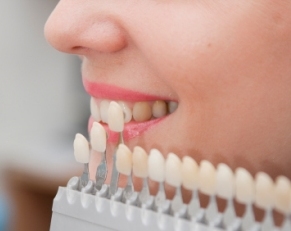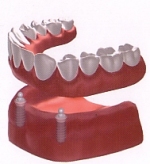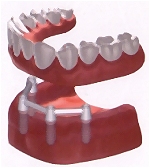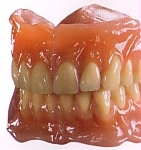|
Frequently asked questions about dentures and general information
Things to know about new dentures
Whether you are trying your first dentures or replacing your current dentures, here are some experiences you may feel with your new dentures:
Fullness: It is normal to feel as if someone left a shoe in your mouth. For most people, they now have more teeth than they have had for several years, plus the gum material necessary to hold your denture in place. This feeling of too much will disappear. It is normal to collect large amounts of saliva in your mouth in the beginning. It is like having a mouth full of pebbles. This problem usually disappears in a few hours to a few days.
Looseness: The upper denture will usually tighten within 24 hours. The lower denture will tighten, but may take a few weeks. Actually, it is not so much that they will gain any real suction, but that the muscles and tissues in your tongue, cheeks and lips train themselves to hold your lower denture in place.
Chewing: Here comes the tricky part. Remember that you were not born with the ability to make the dentures work. The upper denture will usually take care of itself. The lower denture, however, will absolutely try to get itself tangled up with your tongue and turn upside down the first few times you begin to chew. Your tongue is used to having total freedom, especially when swallowing when it dips down and back up. |
 |
It is normal with natural teeth for your tongue to gather the food on one side of the mouth and roll it over to the side to be crushed. Before you learn to restrict these movements your denture will come up with your tongue. Get in the habit of cutting your food into small bites. A large size bite will have a tendency to displace your dentures. Begin to learn to chew by placing a bit on both sides toward the back of your dentures, and try to mash your food evenly by chewing up and down like a machine. Eventually, you will be able to manage almost anything, but it is definitely something you must learn.

Thoughts for the experienced denture wearer
 |
Those of you who have had dentures before must expect to encounter some difficulty with new dentures; it is normal. Your problems may not be as extensive as the "first time" denture wearer, but you too can expect a few weeks of getting back to normal.
Understand that old dentures are a little like old shoes, even though they may be worn out and do not continue to give adequate support, you are used to them. Similarly, you probably have had eight to ten years experience with your present dentures. They work for you - especially the lowers - because your lips, cheeks and tongue have all collectively trained themselves to help you make them work. Now you must learn "new tricks". New chewing patterns require your muscles to be re-educated to assist you with a new up-to-date shape. Do not put your old dentures back in your mouth. |
Nothing will defeat the success of new dentures so completely than to switch back to an old set. Put your old dentures away and do not even look at them. It is most important that you have uninterrupted experience with your new dentures for several days, maybe weeks. Do not defeat your efforts of success and the efforts of your denturist by cheating and using your old dentures. |

Immediate denture process
Having your dentures inserted at the very moment your remaining teeth are extracted has advantages and disadvantages. The main advantage, of course, is not having to be toothless
during the healing and preliminary gum shrinkage period about 2-6 months. Here some of the disadvantages: |
Gum shrinkage: Following extraction of a tooth, the bony socket surrounding the area begins to shrink as a normal part of the healing process. This occurs rapidly during the first few weeks, then tapers off to practically nothing after about 3 months. How much and how soon may vary greatly with each individual. Just as you might heal faster than someone else, see better, or run more slowly, your reaction to this process can also vary greatly from someone else.
This is certainly true where dentures are concerned. They are as different as fingerprints. For some, this shrinkage will be so rapid and so great that the dentures will loosen practically from the moment they are inserted. On the other hand, there are some people who have so little shrinkage that their dentures fit tightly from the beginning and will continue to do so. However, regardless of how good your dentures feels it should be relined sometime during the next six months following extractions. (To avoid confusion, it should be noted that this procedure is separate from the original denture construction and requires a modest fee in addition to the original denture fee.) |
 |
Trial Insertion: All complete professional denture construction methods include a trial insertion. What this means is that the final teeth are secured in a wax base temporarily and tried in your mouth prior to finishing the denture. This step is critical and necessary to assure you and your denturist that the bite and appearance are correct for you. Do the teeth agree with your facial contours? Are they the right colour? Do they protrude too much or not enough?
With a trial insertion the teeth are in wax and changes can still be made prior to finishing your dentures. Obviously, if you still have some of your teeth this step cannot be done as completely as if you had no remaining teeth, so it becomes a weakness for immediate insertion dentures. The problem is offset somewhat by having a few remaining teeth to guide the denturist.

Transitional dentures
An experienced operator can eliminate most of the problems arising with immediate dentures. however, sometimes the post-extraction changes or pre-extraction condition of the teeth and underlying bone lead to problems of fit or looks that are simply too extensive to overcome at the time of reline and a new denture must be made to bring that person back to normal. The charges for this denture are over and above the original cost. As a matter of fact, there are many denturists who use the first denture as a temporary or transitional appliance and plan from the beginning to construct the permanent denture six to nine months following extraction.
Sore spots
Sore gums or sore spots can be caused by a number of reasons. In the case of new dentures the usual problems are areas that are a bit too long or uneven pressure being applied by the tissue bearing area of the denture. This usually requires a simple adjustment by your denturist. However, here as with everything else, people vary considerably. Some people have practically no trouble at all, while some have a lot of trouble.
Also, many things can contribute to sore gums. For example, diabetic patients may have a great deal of more sore spot complications than the average patient. People taking blood thinners, patients with potassium imbalance, in fact just about any systemic problem an individual may have will contribute to weaken the live supporting tissues for dentures. This is not to imply that if you are having trouble with your denture that you have some mysterious disease. Only that your denturist is a trained professional who is trying to help you with your problems, not create them for you.
 |
Treatment for sore spots: The best home treatment for "blisters" that arise from new dentures is a gentle rinse several times a day with a mixture of salt and warm water. Any of the current over-the-counter oral pain killers may be used for some immediate relief. Sometimes it might be useful to remove the dentures for a few hours, then replace them later. Never hesitate to ask your denturist what he recommends.
The most helpful thing you can do is to try diligently to leave your denture in place at least 18-24 hours prior to your adjustment visit, so the denturist can actually see the problem and correct it quickly. Also, try to wait five days to one week between visits, as many of these problems will go away on their own. |

Wearing dentures at night
Most denturists recommend leaving the upper denture in your mouth at night in order to keep your lips filled out, but removing your lower denture. The lower denture may fall out while you are sleeping. Remember, the lower denture is held in place because of your conscious effort using your lips, cheeks and tongue. When you are sleeping this process virtually stops so your lower denture will frequently loosen and actually fall out.
Another reason for removing your lower denture at night is the possibility of tooth grinding. Some people grind their teeth during sleep. Many people are not aware they are doing it. Often these individuals awaken with sore spots under the lower denture. It would obviously be advantageous for these individuals to remove their lower denture. However, always remember ... denture wearing is unique to the individual and your decision depends on your comfort.

Removable implant dentures
Dental Implants are dentistry's finest solution for replacing missing teeth.
Your new teeth will feel solid like natural teeth and, in most instances, will last for many, many years allowing you to eat whatever you want without any problems. |
  |

Replacing a denture
 |
How often should you have your dentures checked? Unless you are having some obvious problem or unless you have been
instructed otherwise, you should have your dentures checked by a professional at least every 1-2 years. If yours is the first denture made after extractions, you probably should have them checked even more frequently.
How long should a denture last? There is certainly a great deal of misunderstanding in this area. A well constructed denture may last one hundred years. However, remember they are a false appliance and in this respect like eyeglasses. If you do not drop and step on any one pair of glasses they might last forever, however, as with all living tissue, your eyes and your mouth are constantly changing. Your dentures actually remain intact, they simply must be remade in order to update the new set of conditions in your mouth. If the changes are only slight, for example, causing the dentures to be loose, then the problem may be dealt with by simply relining or putting a new inside in your existing denture. |
Your gums are shrinking a little each day, but at such a slow rate you are not aware of the change. Then one day you take a good look at yourself and notice your face has sunken. A classic indication of the need for new dentures is when a person looks as though his chin might touch his nose if he were to close his mouth tightly. This often creates a "mean" look, or makes an individual look much older than his actual age.
Most important are the possible joint and muscles complications which can arise as a result of constantly closing your mouth too far. Frequent headaches and even hearing problems can occur from wearing dentures which are too short. Your denture should be carefully examined after about 2 years. If teeth are worn down a replacement may be necessary.

Caring for your dentures
 |
Dentures benefit most from a good scrubbing. This can be best done with a soft toothbrush or one specially made for dentures.
You may use soap and water or a special denture cream. This should be done after meals when possible and at bedtime.
If you take your dentures out at night, they should be kept moist, but not left in a glass of water. Our dentist can provide you with a special box for that.
|
Tartar buildup: Tartar or calculus, a white chalky material, will trouble some people. It is a deposit from your saliva and usually found on the upper denture in the area of the molars and the lower denture on the inside surface of the lower front teeth. These are the places where you have salivary duct openings. An interesting observation is that the deposit is usually heavier on the side you sleep.
To remove tartar that has hardened, soak your dentures overnight in a solution of half vinegar and half water.
This will usually soften the tartar to the point where it can be brushed away. Extremely hardened deposits may have to be removed by your dentist, who will professionally clean your denture for a modest fee.
Stains: Tea, coffee, tobacco smoke, well water containing heavy iron deposits and often just breathing through your mouth in a dusty environment can cause stains. Those stains which cannot be brushed away occasionally need help from special cleaners.
When cleaning your dentures, you should always fill a basin half full of water, then brush your dentures while holding them over the water. This way, should you drop your denture, it will fall into the water and be protected from breaking. All denture and denture teeth materials may be prone to breakage if dropped on any hard surface such as porcelain, terrazzo, or tile. It is also advisable to hold the lower denture by one side at a time while brushing. Some people may squeeze harder as they brush harder; holding both sides of the lower denture puts undue pressure on the appliance which could crack or break the denture in half.
Chewing gum: Most chewing gum sticks to new dentures: some brands of gum are worse than others. This problem appears to be inherent in new dentures and most people report that the problem disappears after a few months. Sugarless chewing gums, however, do not seem to be a problem at all and many people use sugarless gum to practice getting used to new dentures. A sonic cleaning machine is a great instrument along with a cleaning solution to remove tartar and stains. |
 |

Dentures and oral examinations
 |
The question often asked:
"Now that I do not have my natural teeth is it necessary to have regular oral examinations?".
As with any other area of your body, it is always important to be aware of changes. A good recommendation is to have your mouth checked once a year, even if you have no known troubles.
Also, a good rule of thumb is that any denture irritation problem showing no tendency for improvement after about ten days should be examined by a professional. |

The BPS Denture
Unmatched Quality and Comfort = Biofunctional Prosthetic System
Comfort: reduced irritation to the gums
Strength: extremely dense material reduces the chance of breakage
Cleanliness: non porous surface greatly lessens odour causing plaque and bacteria
Great fit: non irritating and comfortable to wear
Healthy: eat virtually any food
Aesthetics: natural looking so you can smile, speak and laugh with confidence
Bio-compatible: will not distort taste, stain, or collect odours or irritating bacteria
Here is what you can expect!
- Premium quality dentures that instill confidence and provide comfort
- Precision dentures that provide optimum function while eating, speaking or laughing.
- Natural, life-like dentures that recreate the character of your smile.
- DENTURES THAT LOOK, FIT AND FUNCTION LIKE YOU WANT THEM TO!
Processed under constant pressure in the patented Ivocap injection system for dimensionally stable, dense and accurate dentures.
Click here to read more! |

|

|














